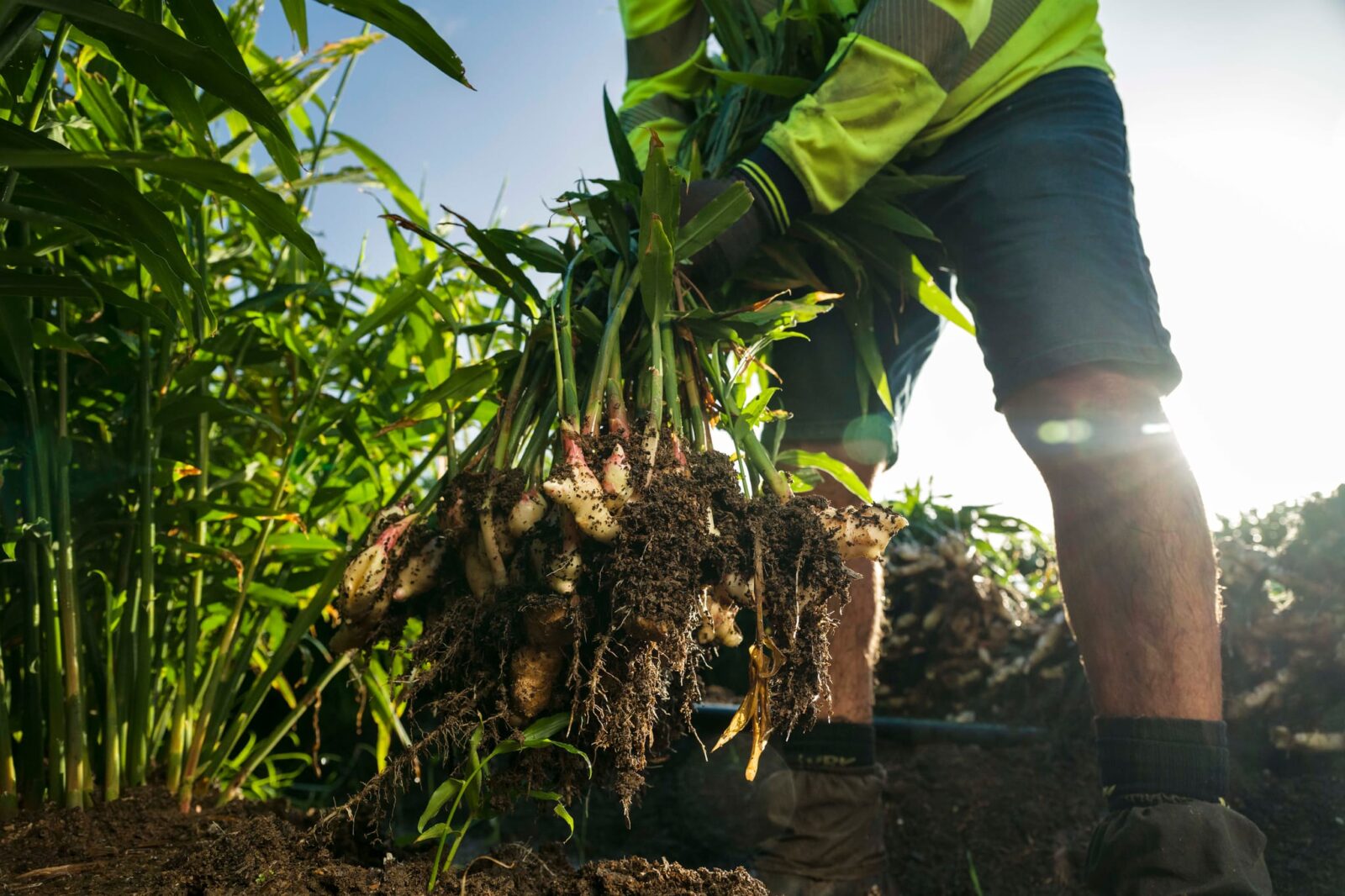Grower insights guiding the next Rice RD&E Plan

 GINGER / Tuesday, 8 October 2024
GINGER / Tuesday, 8 October 2024 
The AgriFutures Ginger Program focuses on ensuring a continued premium for Australian ginger with four key objectives:
The AgriFutures Ginger Program RD&E Plan (2022-2027) identifies and balances the research, development and extension priorities and outcomes to promote industry. Through investment in targeted and high-impact projects, the Program aims to drive innovation, improve productivity, and ensure the long-term sustainability of the ginger industry.
The AgriFutures Ginger Program has nine research projects currently underway. This suite of projects spans across the four RD&E priorities. These projects are outlined below.
Priority 1: High-quality product and sustainable production systems
Chlorantraniliprole (Coragen) residue trials, analysis and permit for the ginger industry (Agaware Consulting Pty Ltd)
AgriFutures Australia on behalf of the Australian Ginger Industry Association (AGIA) is seeking the continued access to the selective agricultural insecticides, Coragen® Insecticide (chlorantraniliprole) for the management of fall armyworm (Spodoptera frugiperda) and other lepidopteran larvae in field grown ginger crops. These pests impact the productivity of crops and the quality of the plant to produce rhizomes. Management of the pests will increase financial opportunities for ginger growers. This project will manage the preparation and submission of the permit application and ongoing discussions with APVMA until the permit is issued.
Beneficial plant growth promoting rhizobacteria (PGPR) as bio-controls against ginger soil pathogens, Fusarium and Pythium, and effectiveness as bio-fertilisers (SoiLife and Sustainable Solutions Hub)
The project aims to identify the top three performing beneficial plant growth promoting rhizobacteria (PGPR) that can be introduced to ginger fields and promote ginger growth in the absence of disease. The beneficial microbes will be investigated for their benefit as a bio-fertiliser in fixing atmospheric nitrogen, solubilising phosphate, reducing abiotic stress, and producing plant hormones. The performance of the ginger plant will be measured through plant growth rate, leaf area and plant height.
Ginger Industry Preparedness for Guava Root-knot Nematode (Meloidogyne enterolobii) (Queensland Department of Agriculture and Forestry)
This project aims to increase the ginger industry capacity, through QDAF, to respond to GRKN. Project work will include ginger-specific research for pathogenicity, as well as assess and develop tools to rapidly identify GRKN and other root knot nematodes (RKN) in ginger production.
Ginger Chemical Minor Use Permit maintenance and research (Censeo Field and Lab Pty Ltd)
Ginger is predominantly grown in Australia in the Sunshine Coast and Wide Bay–Burnett regions of Queensland. The area under ginger production is relatively small, and this small market limits the number and scope of registered pesticides available to growers. To gain access to essential chemical control options, the industry commonly needs to rely on Minor Use Permits (MUPs) granted by the Australian Pesticides and Veterinary Medicines Association (APVMA). The lapse of current MUPs for products regularly required by the ginger industry would have a significant impact on the industry and the potential to cause significant crop losses. This project aims to maintain and update existing MUPs as well as investigate options for new products for the ginger industry, as part of the AgriFutures Ginger Program.
Improving ginger, to future proof the industry against major pest and diseases (University of the Sunshine Coast)
Introducing genetic diversity to Australian ginger is required for the ginger industry to cope with growing pest and disease pressures. This project will address the critical issue of the narrow genetic base of edible ginger (Zingiber officinale) and the associated risks of pests, diseases and climate impacting edible ginger production. Ginger genetic improvement is difficult due to the absence of seed set following pollination, however, a scoping study also found evidence this may be due to the pollination techniques attempted rather than the species being sterile. This project will investigate pest and disease resistance in edible and closely related gingers with the aim of increasing the genetic diversity, reducing risks, and facilitating the expansion of the Australian ginger industry.
Priority 2: Market opportunities
The AgriFutures Ginger Program continues to seek projects that support this priority.
Priority 3: Technology and innovation
Development of Molecular Diagnostic for Fusarium oxysporum f.sp. zingiberi (Foz) (The University of Queensland)
“Fusarium yellows” in ginger is caused by Fusarium oxysporum f.sp. zingiberi (Foz). This fungal pathogen is soil borne, attacking ginger roots and rhizomes leading to rhizome decay and disruption of the plant’s vascular system with the first visible symptoms in the field being the characteristic yellowing of the pseudostems. This project aims to confirm the profile of genes SIX 7, SIX 9, SIX 10 and SIX 12 in Fusarium oxysporum f.sp. zingiberi (Foz) and in endophytic isolates sampled from ginger and plants in ginger rotations, confirm the profile of genes SIX 7, SIX 9, SIX 10 and SIX 12 in different fusarium strains, and refine the UQ Foz primer as appropriate with the findings from the Foz isolate sequencing.
Priority 4: Industry engagement
Ginger Extension Coordination Project (Australian Ginger Industry Association Incorporated)
This project will deliver extension coordination services that will increase adoption and practice change related to improving productivity and profitability for ginger businesses. It will also deliver effective and efficient extension and communication services to develop a stronger and more resilient ginger industry.
Learn more about the AgriFutures Ginger Program
Subscribe to ginger industry news and updates
 CHICKEN MEAT / 08.10.24
CHICKEN MEAT / 08.10.24  THOROUGHBRED HORSES / 08.10.24
THOROUGHBRED HORSES / 08.10.24  GLOBAL INNOVATION NETWORKS / 08.10.24
GLOBAL INNOVATION NETWORKS / 08.10.24  WORKFORCE AND LEADERSHIP / 08.10.24
WORKFORCE AND LEADERSHIP / 08.10.24